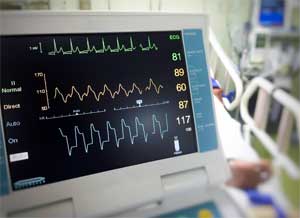- Home
- Editorial
- News
- Practice Guidelines
- Anesthesiology Guidelines
- Cancer Guidelines
- Cardiac Sciences Guidelines
- Critical Care Guidelines
- Dentistry Guidelines
- Dermatology Guidelines
- Diabetes and Endo Guidelines
- Diagnostics Guidelines
- ENT Guidelines
- Featured Practice Guidelines
- Gastroenterology Guidelines
- Geriatrics Guidelines
- Medicine Guidelines
- Nephrology Guidelines
- Neurosciences Guidelines
- Obs and Gynae Guidelines
- Ophthalmology Guidelines
- Orthopaedics Guidelines
- Paediatrics Guidelines
- Psychiatry Guidelines
- Pulmonology Guidelines
- Radiology Guidelines
- Surgery Guidelines
- Urology Guidelines
Treating subclinical hyperthyroidism may increase atrial fibrillation risk: JAMA

A study by researchers at Vanderbilt University Medical Center has found that even treating subclinical hyperthyroidism may increase atrial fibrillation risk. The genetically determined variations in thyroid function, even those which fall within a physiologically accepted "normal" range, still can increase the risk for AF. The study has been published in the journal JAMA Cardiology.
The study strengthened the link between thyroid function and atrial fibrillation (AF), that increases the risk of stroke and other heart-related complications. The researchers carried out the study to find an association between a polygenic predictor of thyroid function and atrial fibrillation (AF) risk.
Previous observational studies have found that subclinical hyperthyroidism, an overactive thyroid which does not meet the clinical threshold for diagnosis or treatment, nevertheless can increase the risk of AF. But whether to treat subclinical hypo- or hyperthyroidism to reduce AF risk remains a matter of debate in the medical community.
The researchers performed a phenome-wide association study of 37 154 individuals applied a genetic predictor of thyrotropin levels to an electronic health record cohort and identified expected associations with thyroid disorders as well as a significant inverse association with AF, even after dropping cases of overt thyroid disease. This finding was replicated in an AF genome-wide association study (17 931 AF cases and 115 142 controls).
The study scanned the medical records of more than 37,000 people for an association between genetically determined variation in thyroid stimulating hormone levels (a measure of thyroid function) and AF risk.
The researchers found that genetically determined variations in thyroid function, even those which fall within a physiologically accepted "normal" range, still can increase the risk for AF.
The clinical decision to treat subclinical thyroid disease should incorporate the risk for AF as antithyroid medications to treat hyperthyroidism may reduce AF risk and thyroid hormone replacement for hypothyroidism may increase AF risk, the researchers concluded.

Disclaimer: This site is primarily intended for healthcare professionals. Any content/information on this website does not replace the advice of medical and/or health professionals and should not be construed as medical/diagnostic advice/endorsement or prescription. Use of this site is subject to our terms of use, privacy policy, advertisement policy. © 2020 Minerva Medical Treatment Pvt Ltd